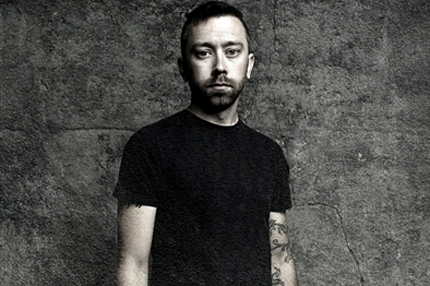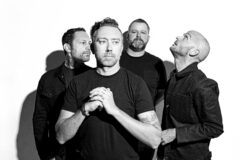For more than a decade, Rise Against have been one of punk’s most visible and unapologetically political bands, delivering raging albums that have condemned the Bush Administration and the bungled war in Iraq, among other things, while supporting animal rights, veganism, and straight-edge living. They’re also one of the genre’s most successful acts: Their last album, Appeal to Reason, opened up at No. 3 on the charts – a career high.
On March 15, Rise Against will release a new album titled Endgame and it may be their most ambitious set of songs yet. Frontman Tim McIlrath has mapped out a haunting vision of what would happen should humanity and society as we know it cease to exist. It rocks plenty, too: Lead track “Help Is on the Way” is a dizzying anthem that morphs from an arena-ready belter into a balls-to-the-wall hardcore epic.
McIlrath’s dark, apocalyptic vision on Endgame was inspired by years of listening to punk and hardcore bands like Minor Threat and reading novels like George Orwell’s 1984 and Joseph Heller’s Catch-22, to which he was initially exposed as a soccer-playing teen growing up in the Chicago suburbs.
As the band – McIlrath, singer-bassist Joe Principe, drummer Brandon Barnes, and guitarist Zach Blair – gears up for their new album, SPIN asked McIlrath to break down the essential albums, songs, and books that shaped his approach to songwriting.
MINOR THREAT’S COMPLETE DISCOGRAPHY
McIlrath was 15 when he discovered punk bands like the Descendents and Black Flag, but it was Ian MacKaye’s pioneering D.C. hardcore group that resonated the most. “It was the first time I really thought about music being something more than just what’s playing in the background,” says McIlrath, who cites the band’s career-spanning 1989 compilation Complete Discography as his favorite Threat release. “They had such purpose to their songs.”
In fact, the straight-edge philosophy of MacKaye’s lyrics made McIlrath feel validated about his choice to abstain from drugs and alcohol: “That was what introduced me to straight edge. I was already the guy who didn’t drink or do drugs, and I wasn’t able to articulate why I made that choice. But hearing Minor Threat was really eye-opening for me.”
JAWBREAKER’S “TOUR SONG”
After being introduced to the pioneering California band, McIlrath saw that punk music could have an intellectual sophistication similar to classic books like Alduous Huxley’s Brave New World. “It was the first time I saw brilliant writing in punk music,” he says. “It wasn’t just four lines of ‘I hate my mom, I hate my dad.’ It was well written stuff and some of the most beautiful writing in punk rock – amazing imagery, amazing stories.”
McIlrath cites the band’s 1992 track “Tour Song” as a prime example of singer Blake Schwarzenbach’s lyrical gifts. “It’s all about being on tour with your band, and everything that could go wrong, goes wrong. He’s telling the story of being on stage, not getting paid for the gig, the crowd hates them, he breaks a string while playing… but the moment you hit the chorus of a song, and you hit that right note, everything that’s bad just fades away.”
REFUSED’S SONGS TO FAN THE FLAMES OF DISCONTENT
The Swedish act was known for being far more experimental than typical balls-to-the-wall hardcore acts, mixing in time signatures, discernable melodies, and other prog elements. “Their music was so brave and compelling that it offended a lot of purists,” says McIlrath, citing the band’s album Songs to Fan the Flames of Discontent as their finest work. “They used different beats, drum machines, sometimes symphony tones, pretty melodies – they took it way out there, but it definitely reshaped the mold.”
CROSBY, STILLS, NASH AND YOUNG’S “OHIO”
McIlrath says of Neil Young (who wrote this track): “He was the most confrontational of the protest singers from that era. He was unafraid.” In fact, McIlrath performs an acoustic version of the song during Rise Against’s live shows – mostly to inspire younger fans who may not know about the abundance of political music that came out of the ’60s. “That music nowadays lives in the margins,” he says. “It’s all Black Eyed Peas and Maroon 5 on the airwaves, but back then, protest music was the airwaves. Our generation can learn from that.”
SIDEKICK KATO
McIlrath religiously followed this relatively obscure Chicago punk band as a teen. “No one’s ever really heard of them,” he says of the group, whose music ranged from mellifluous ballads to fist-pumping anthems. “But as a kid, they were the biggest band in the world to me.” He was mesmerized by the lead singer, Tom, whose vocals showed a broad tonal range. “He could go from being frail and beautiful in a Thom Yorke kind of way to this powerful scream,” says McIlrath. “It was really intense and cathartic. It’s sad because they’ve been lost to history. They only really live in my imagination.”
JOSEPH HELLER’S CATCH-22
One of Rise Against’s new tracks, titled “Survivor Guilt,” was inspired by the film adaptation of Heller’s novel, which featured the acting debut of Art Garfunkel. In fact, the track features dialogue from one of the movie’s pivotal scenes, where Garfunkel’s character argues with an Italian solider about America’s military importance: “Garfunkel says to him, ‘How can Italy be powerful when they were occupied by Nazi Germany?’ and the soldier just sort of laughs at his stupidity and tells him, ‘Well, we’re still here – where are those people who occupied us? They lost.’ It’s this interesting anti-war statement and you can just see it blowing the soldier’s mind.”
GEORGE ORWELL’S 1984
McIlrath says Orwell’s classic dystopian novel sparked a political awakening and taught him to be skeptical of big government – topics which the band revisits on their new album. “It showed me there’s a seedier underbelly to the gears of society,” he says. “Where I grew up, life was perfect. Everyone had two cars, we all went to school, and played soccer. But this book just turned my world upside down and made a lightbulb go off in my head.”





